The symbiotic relationship between humans and dogs in hunting has a storied history, dating back to millennia. Dogs, with their acute senses and specialized skills, have been indispensable assets to hunters across cultures and eras. From tracking prey to retrieving game, the best hunting dog breeds have elevated the hunting experience, fostering a unique bond between man and beast. In this article, we will look into what breeds make good hunting dogs to help you make an informed choice when selecting the perfect partner for your hunting adventures.
Importance of Choosing the Right Dog Breed for Hunting
Choosing the right hunting dog is a decision that can make or break a successful hunt. The diverse characteristics of various breeds play a crucial role in determining their suitability for specific tasks. In this guide, we’ll explore the physical traits, temperament, and specialized skills that make certain breeds excel as hunting companions.
Characteristics of Good Hunting Dogs
First, let’s start with the characters that make a hunting dog a good hunting dog.
Physical traits
Size and Strength: A balance of size and strength is essential. Larger breeds may excel in retrieving larger game, while smaller, more agile breeds may navigate dense terrain with ease. It is your responsibility to know what size category the dog you want belongs to and if it is the appropriate size for your needs.
Stamina and Endurance: Long hours in the field demand dogs with exceptional stamina and endurance to keep pace with their human counterparts.
Speed and Agility: The ability to move swiftly and navigate obstacles is crucial for flushing out game or pursuing it in the field.
Temperament
Trainability: A trainable nature ensures that the dog can quickly grasp commands and instructions, making it an effective partner in the field. Make sure you start gun dog basic obedience training at an early age.
Intelligence: Intelligent dogs can adapt to various hunting scenarios and make split-second decisions, enhancing their overall effectiveness.
Eagerness to Work and Please: Dogs that take joy in their work and seek to please their owners make for loyal and dedicated hunting companions.
Specialized Skills
Sense of Smell: A keen sense of smell is a hallmark of a great hunting dog, aiding in tracking and locating game.
Retrieval Abilities: Retrievers excel in retrieving downed birds from water. This is crucial that all gun dogs should learn especially when hunting birds.
Tracking Skills: The ability to track and follow a scent trail is invaluable for locating wounded game. Hunters rely on their dogs for tracking since birds use camouflage so they can be difficult to spot visually.
Popular Breeds for Hunting
Pointing Breeds
English Pointer
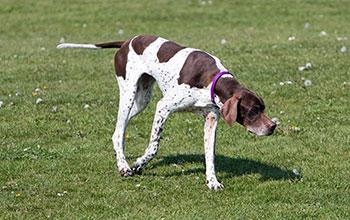
Breed Info
The English Pointer originated from England. This breed is distinguished by its athletic build and graceful, balanced stance. It typically has a short, smooth coat that comes in a variety of colors from liver, lemon, black, or orange, either solid or mixed with white.
What Makes Them Good for Hunting?
Renowned for their exceptional pointing and steadiness when hunting game, English Pointers excel in locating and marking the position of birds, providing hunters with a clear indication of the prey’s location.
German Shorthaired Pointer
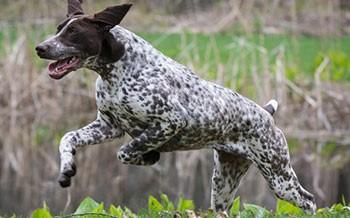
Breed Info
The German Shorthaired Pointer is a versatile and intelligent breed with a sleek, short coat. Known for its boundless energy and friendly demeanor, it is a well-rounded hunting companion.
What Makes Them Good for Hunting?
Their versatility in pointing and retrieving makes them invaluable in various hunting scenarios. German Shorthaired Pointers are adaptable and quick learners, making them excellent partners for a range of game pursuits.
Brittany Spaniel
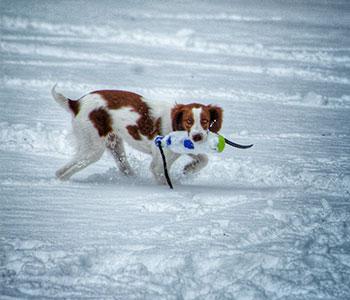
Breed Info:
The Brittany Spaniel, often referred to as the Brittany, is a compact and agile breed known for its striking orange and white or liver and white coat. These dogs are renowned for their friendly disposition and enthusiasm for hunting.
What Makes Them Good for Hunting?
Brittany Spaniels are highly regarded for their pointing abilities and versatility. They can point at game birds with remarkable precision, and their compact size allows them to work effectively in dense cover. Their natural hunting instincts and eagerness to please make them ideal companions for upland game hunters.
Retrievers
Labrador Retriever
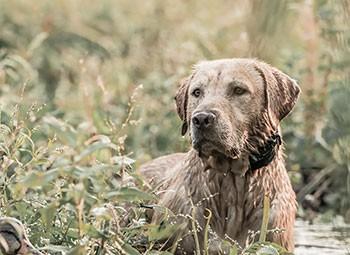
Breed Info
Labrador Retrievers are friendly, outgoing, and medium to large size. Their short, water-resistant coat and otter-like tail make them well-suited for water retrieval.
What Makes Them Good for Hunting?
Labradors are exceptional water retrievers, excelling in retrieving waterfowl. Their gentle disposition and strong work ethic make them ideal partners for hunters who frequent wetlands.
Golden Retriever
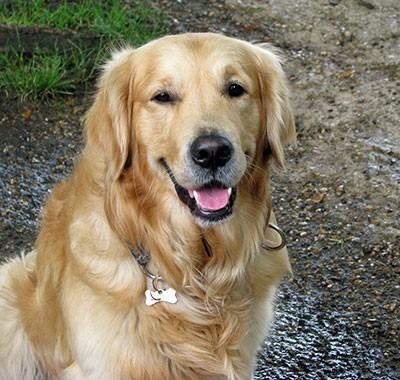
Breed Info
Golden Retrievers are known for their intelligence, friendly demeanor, and luscious golden coat. They are medium to large size and are highly adaptable.
What Makes Them Good for Hunting?
Gentle retrievers with a soft mouth, Golden Retrievers are well-suited for retrieving waterfowl. Their eagerness to please and trainability make them versatile companions in the field.
Chesapeake Bay Retriever
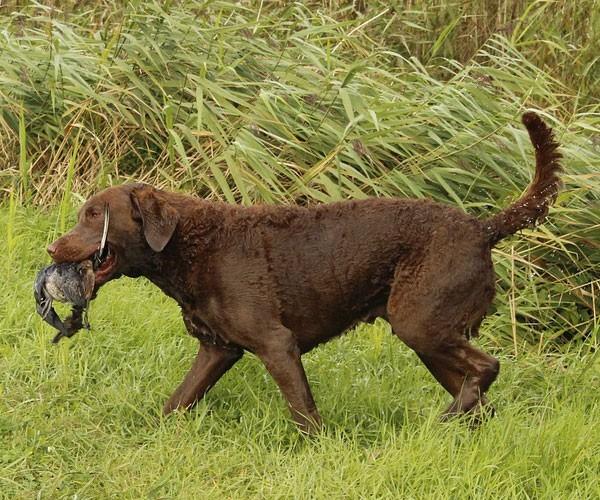
Breed Info
The Chesapeake Bay Retriever is a strong, versatile, and medium to large-sized breed. Their dense, waterproof coat provides protection in harsh weather conditions.
What Makes Them Good for Hunting?
Renowned for their exceptional swimming abilities, Chesapeake Bay Retrievers are well-suited for retrieving waterfowl in challenging conditions, including cold water and rough currents.
Flushing Spaniels
English Springer Spaniel
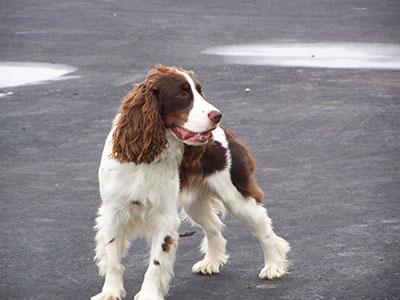
Breed Info
English Springer Spaniels are energetic, medium-sized dogs known for their versatility in the field. They have distinctive long, pendant ears and kind, expressive eyes that contribute to their amiable appearance. Their coat, which is moderately long and can be either straight or wavy, comes in combinations of black or liver with white.
What Makes Them Good for Hunting?
With excellent flushing and retrieving abilities, English Springer Spaniels are adept at locating and springing game for hunters. Their boundless energy makes them suitable for various terrain.
American Cocker Spaniel
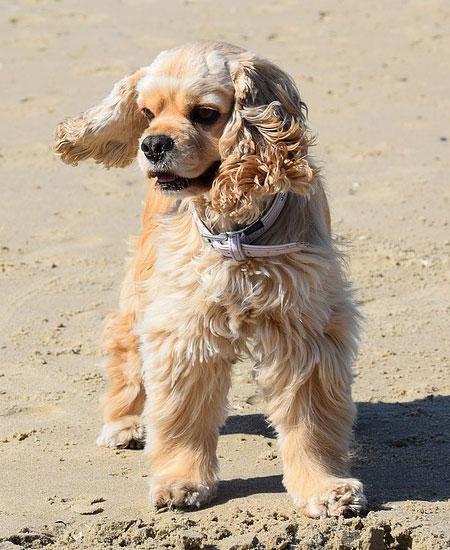
Breed Info
The American Cocker Spaniel is a beloved breed known for its gentle and affectionate nature. This breed is considered a variation of the English Cocker Spaniel and was bred to be a bit smaller with a different head and coat. It has a luxurious, silky coat and soulful expression.
What Makes Them Good for Hunting?
Their compact size and proficiency in flushing make American Cocker Spaniels well-suited for hunting in dense cover, particularly in upland game bird scenarios.
English Cocker Spaniel
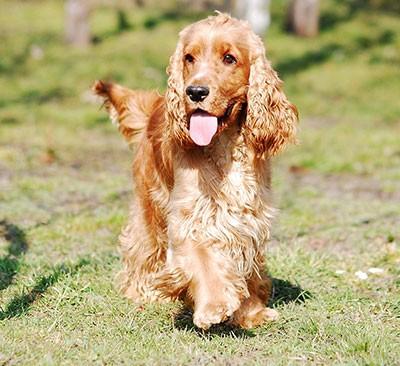
Breed Info
Compact and merry, English Cocker Spaniels have a shiny silky coat with feathering on the ears, chest, legs, and belly. They are known for their adaptability and friendly demeanor.
What Makes Them Good for Hunting?
Agile and skilled in dense cover, English Cocker Spaniels are excellent flushers and retrievers. Their versatility makes them valuable in a variety of hunting settings.
Boykin Spaniel
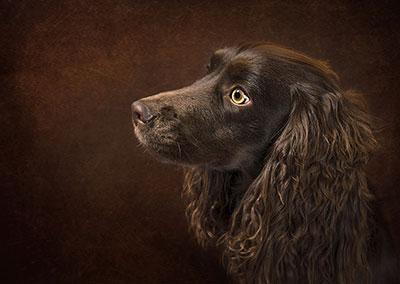
Breed Info
The Boykin Spaniel is known to have a medium-sized build and originated in South Carolina Their coat is typically wavy and has a feathery tail. This breed also has a rich, brown or chocolate coat. They have soulful, expressive eyes that are usually amber or brown, adding to their friendly appearance.
What Makes Them Good for Hunting?
Exceptional at retrieving in varied terrains, Boykin Spaniels are particularly well-suited for waterfowl retrieval and upland game hunting.
Field Spaniel
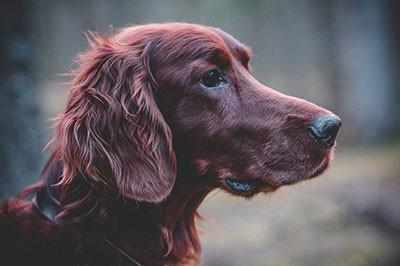
Breed Info
Field Spaniels are well-proportioned and elegantly built, with a slightly longer body compared to their height. They possess a noble and refined head with expressive, almond-shaped eyes that convey a gentle and intelligent expression. Their coat is moderately long, and silky, and usually comes in solid colors like black, liver, or roan, sometimes with tan markings.
What Makes Them Good for Hunting?
Agile in both land and water, Field Spaniels excel in flushing and retrieving. Their independent nature makes them adaptable to different hunting scenarios.
Irish Water Spaniel
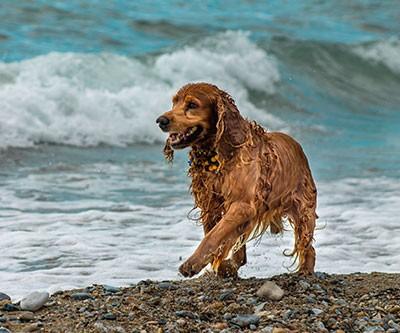
Breed Info
Intelligent and eager to please, the Irish Water Spaniel is a medium to large-sized breed with a notable dense, curly liver-colored coat that is water-resistant and signature “rat tail”, which is thick and curly at the base but tapers into a fine, hairless point. Their coat isn’t just a defining feature but also a functional one, providing excellent insulation and protection in cold water.
What Makes Them Good for Hunting?
Their excellent water retrieval skills make Irish Water Spaniels invaluable for waterfowl hunting. Their intelligence and adaptability contribute to their success in various hunting situations.
Clumber Spaniel
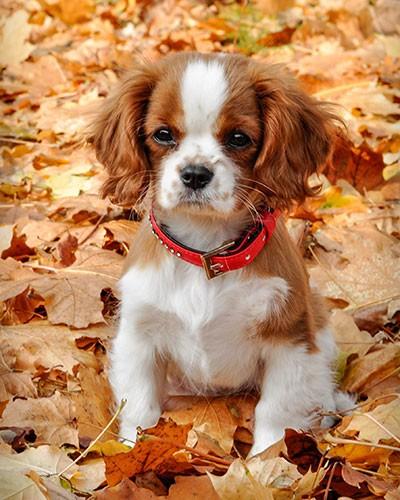
Breed Info
Gentle and dignified, Clumber Spaniels are large, heavy-boned dogs with a distinctive white coat and lemon or orange markings.
What Makes Them Good for Hunting?
Exceptional tracking skills make Clumber Spaniels well-suited for hunting scenarios where precise tracking is essential.
Sussex Tibetan Spaniel
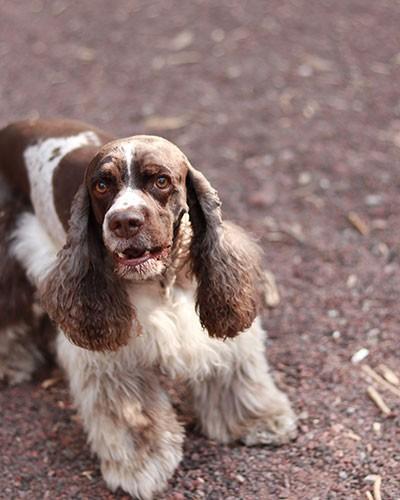
Breed Info
Affectionate and independent, Sussex Tibetan Spaniels are small to medium-sized dogs known for their adaptability.
What Makes Them Good for Hunting?
Adaptable and skilled in diverse terrains, Sussex Tibetan Spaniels are proficient in flushing and retrieving, making them versatile hunting companions.
Welsh Spaniel
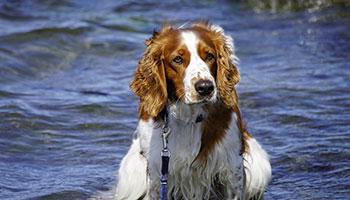
Breed Info
Energetic and friendly, Welsh Spaniels are medium-sized dogs with a study and muscular build, characterized by a slightly domed skull, straight muzzle, and expressive eyes (typically dark or hazel in color). Their most striking feature is their beautiful, rich red and white coat.
What Makes Them Good for Hunting?
Agile in both land and water, Welsh Spaniels excel in flushing and retrieving. Their friendly demeanor adds to their appeal as hunting companions.
Pointers and Setters
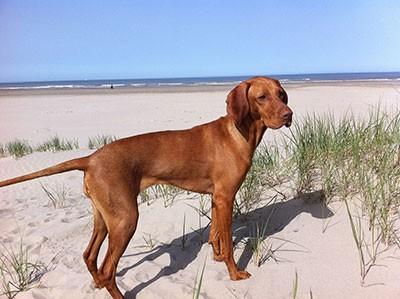
Vizsla
Breed Info
Energetic and versatile, Vizslas are medium-sized dogs known for their golden rust coat and sleek build.
What Makes Them Good for Hunting?
Exceptional pointing and retrieving skills make Vizslas valuable in a variety of hunting scenarios. Their boundless energy and adaptability contribute to their success in the field.
German Shorthair
Breed Info
The German Shorthair is a medium to large-sized hunting dog breed with a well-proportioned, athletic build that enables them to move swiftly and with endurance. They have a short, thick coat that is water-repellant, ideal for working in different weather conditions. The coat color can vary and includes a solid liver, liver and white, or liver ticked or patched.
What Makes Them Good for Hunting?
Versatile in pointing and retrieving, German Shorthaired Pointers are adaptable to various hunting situations. Their intelligence and eagerness to please make them valuable partners in the field.
Wirehaired and English Pointer
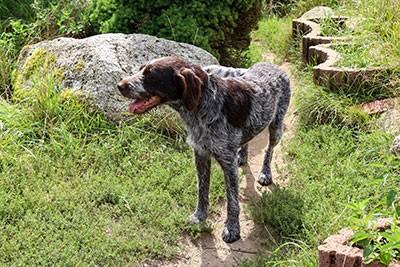
Wirehaired Pointer
Breed Info
The Wirehaired and English Pointer, also known as Wirehaired Pointing Griffon, is known for its remarkable skills in bird hunting and wiry coats. This breed is medium-sized, robust, well-muscled, and versatile. They have a weather-resistant coat, which is usually steel gray with brown markings. They have bushy eyebrows, prominent beards, and a mustache, adding to their distinctive appearance.
What Makes Them Good for Hunting?
Excelling in pointing and retrieving, Wirehaired and English Pointers are well-suited for various game pursuits. Their versatility and stamina make them valuable hunting companions.
Irish, English, and Gordon Setters
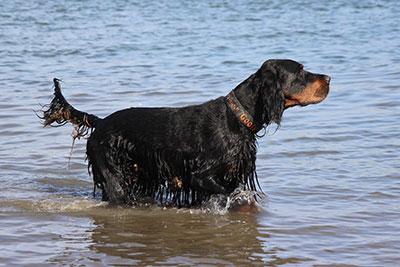
Gordon Setters
Breed Info
Elegant and dignified, Setters are medium to large-sized dogs with distinctive coats. Irish Setters are known for their rich red coat, English Setters for their speckled coat, and Gordon Setters for their black and tan coat.
What Makes Them Good for Hunting?
Exceptional pointing and steadiness on game make Setters valuable in upland game bird hunting. Their elegance and stamina contribute to their success in various terrains.
Weimaraner
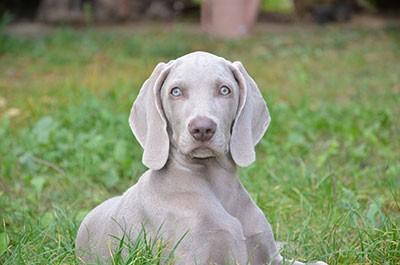
Breed Info
The Weimaraner often referred to as the “Gray Ghost” due to its distinctive coat color, is a breed highly regarded for its hunting prowess, striking appearance, and loyal temperament. Weimaraners are large, athletic dogs with sleek, short coats that range from mouse-gray to silver-gray. They are known for their striking blue or amber eyes, which give them an alert and intelligent expression.
What Makes Them Good for Hunting?
Excellent in tracking and retrieving, Weimaraners are versatile hunting companions. Their intelligence and stamina make them valuable in a variety of hunting scenarios.
Training and Care Tips for Hunting Dogs
Early Socialization
Early socialization is crucial for hunting dogs. Expose your dog to various environments, people, and animals from a young age. This exposure helps them develop well-rounded social skills and reduces the likelihood of fear or aggression towards unfamiliar situations. Introduce your dog to different terrains, water bodies, and hunting scenarios to build their confidence and adaptability.
Consistent Training Routines
Consistent training routines are the foundation of a well-behaved and effective hunting dog. Positive reinforcement training methods work best for these dogs. Start with basic obedience commands such as sit, stay, and recall. Gradually introduce hunting-specific commands like “point,” “retrieve,” and “heel.” Ensure training sessions are short, engaging, and tailored to your dog’s age and skill level. Consistency in training helps your dog understand expectations and builds their hunting skills over time.
Proper Exercise and Nutrition
Adequate exercise and nutrition are paramount for hunting dogs. These dogs are known for their boundless energy, and regular exercise helps them stay in peak physical condition. Engage your hunting dog in activities like running, swimming, and retrieving to channel their energy positively. Additionally, provide a balanced diet that meets their nutritional needs, which may include high-quality commercial dog food or a specially formulated diet for active dogs. Consult your veterinarian to determine the right diet for your specific breed and hunting style.
Routine Veterinary Check-ups
Routine veterinary care is essential for the overall health and well-being of your hunting dog. Schedule regular check-ups with your veterinarian to monitor your dog’s health, administer vaccines, and address any potential issues promptly. Hunting dogs may be prone to specific health concerns depending on their breed, so it’s vital to discuss preventive measures and early detection of conditions with your vet. Regular check-ups ensure that your dog remains in top hunting shape and enjoys a long, active life in the field.
Choosing Your Hunting Partner is Important for a Successful Hunt
Choosing the right hunting dog breed aligned with your specific objectives, be it upland game, waterfowl, or big game pursuits, is an important choice. The success of your hunt hinges on this decision. Remember, each breed contributes distinct skills and traits crucial to the hunt’s outcome. Beyond the practicalities, the bond between a hunter and their dog is an extraordinary partnership founded on trust, loyalty, and shared outdoor adventures.
To prospective hunters, choosing the right breed is the first step in a lifelong adventure that demands dedication, patience, and commitment to training. Happy hunting!
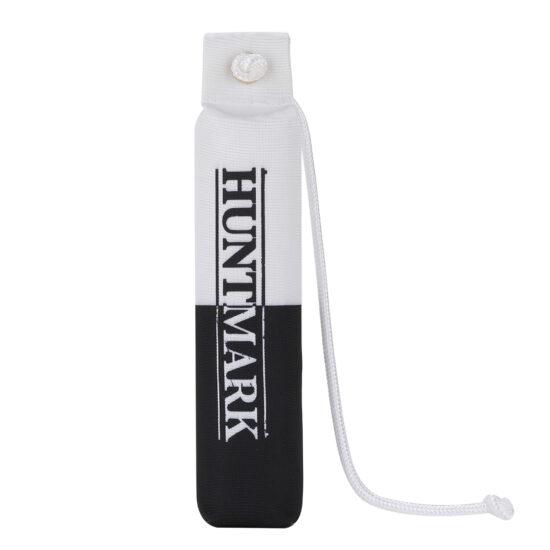
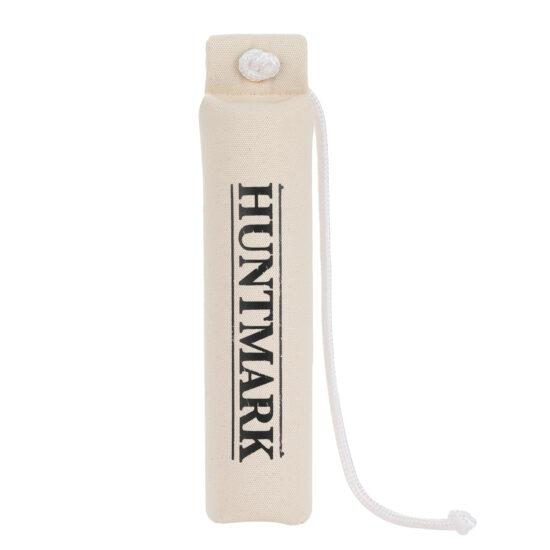
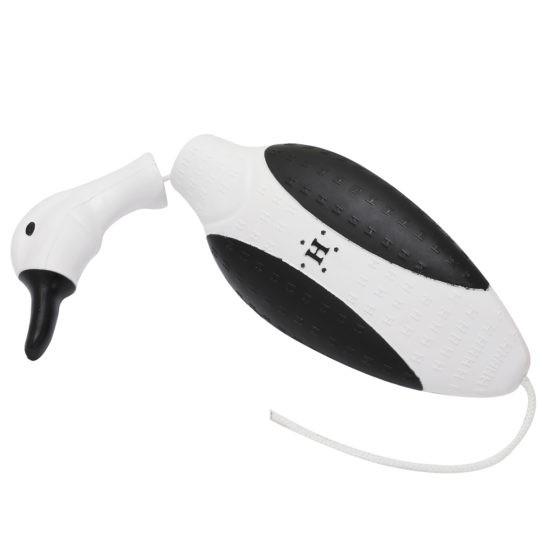
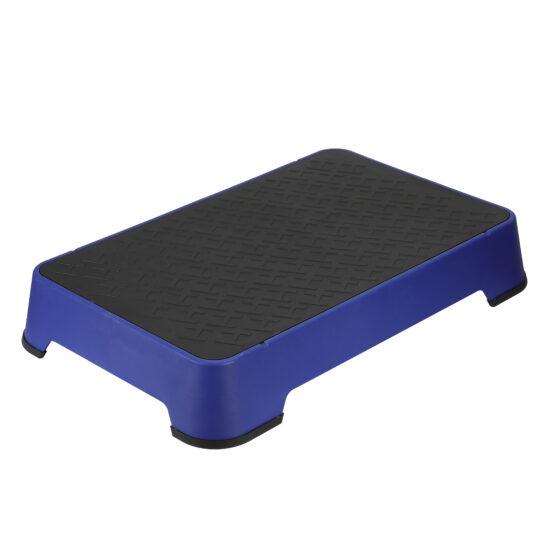



Leave a Reply